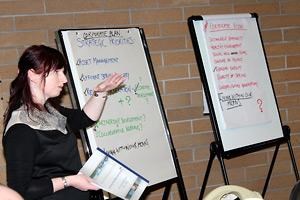City of Powell River elected officials and department managers participated in an all-day strategic planning session on April 5. The session was facilitated by Rachel Buskie, who has recently moved to Powell River.
Buskie has experience working with local governments in the United Kingdom, Australia and New Zealand. She said she noticed that Powell River does not have a corporate plan. “A corporate plan would say this is who we are, this is our identity, this is who we are as an organization and this is what we hope to achieve for the future in a tangible way,” she said.
A corporate plan includes high-level vision/mission statements, as well as a summary of what has been achieved in the past and what is planned for the future, Buskie explained. “It’s a great thing to have a corporate plan, because then everyone can see who we say we are and everyone can get some kind of buy-in to the culture of our organization,” she said. “Once you’ve got that and once you can quantify what you can achieve financially and with the systems that you have, then you can start to take informed choices that will allow you to communicate, work with the community and deliver on the projects they want to see as well.”
Buskie gave an overview of previous work city representatives have done and explained how a strategic plan would follow a corporate plan.
Department heads all gave an overview of their department responsibilities and their strategic objectives. During the discussion of the parks, recreation and culture department, the issue of rural residents sharing in the costs of Powell River Recreation Complex arose.
While the issue has been discussed many times in the past, Councillor Chris McNaughton said, from his point of view, actually achieving results should be an integral part of the city’s strategic priorities. “We have to crack that nut at some point,” he said. “The city taxpayers continue to contribute 100 per cent of the capital and operating costs of this facility.”
City residents also contribute 50 per cent of Powell River Regional District’s regional parks service, McNaughton added. “There is an inequity there,” he said. “We are one community and if we’re going to build upon the conversations that we’ve had within this city government, the only way to do that is to have a clearly defined strategic objective that says we are going to change what has happened for the last 35 years.”
In other areas of the province, regional districts own recreation facilities, McNaughton pointed out, and there is a more equitable distribution of the costs. “We continually have these conversations and we get real push back from rural directors,” he said. “We bring it forward again and we get push back. We have not succeeded at resolving this long-standing issue...We need to have the political will to make it happen.”
Mayor Dave Formosa said the recreation complex is bigger than the city can afford. “Yet we continue to afford to enjoy it. When does the bubble burst?”
He also said he was optimistic that the city will find a way to work with rural directors and find a way for rural residents to contribute to the facility.
Even if there were a contribution from rural residents, the facility is still expensive to operate and maintain, Formosa said. “The complex is a huge cost,” he said. “I say enjoy it while we can and hope we can continue.”
Participants in the meeting agreed on the following strategic priorities: asset management; efficient service delivery; revenue generation; economic development; and partnership development.
Buskie will take all the information generated throughout the day and prepare a draft corporate plan, which will include a corporate vision and mission statement.



